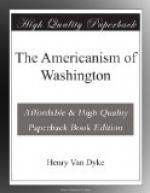“Ah, but he was a rich man,” cries the carping critic; “he could afford to do it.” How many rich men to-day avail themselves of their opportunity to indulge in this kind of extravagance, toiling tremendously without a salary, neglecting their own estate for the public benefit, seeing their property diminished without complaint, and coming into serious financial embarrassment, even within sight of bankruptcy, as Washington did, merely for the gratification of a desire to serve the people? This is indeed a very singular and noble form of luxury. But the wealth which makes it possible neither accounts for its existence nor detracts from its glory. It is the fruit of a manhood superior alike to riches and to poverty, willing to risk all, and to use all, for the common good.
Was it in any sense a misfortune for the people of America, even the poorest among them, that there was a man able to advance sixty-four thousand dollars out of his own purse, with no other security but his own faith in their cause, to pay his daily expenses while he was leading their armies? This unsecured loan was one of the very things, I doubt not, that helped to inspire general confidence. Even so the prophet Jeremiah purchased a field in Anathoth, in the days when Judah was captive unto Babylon, paying down the money, seventeen shekels of silver, as a token of his faith that the land would some day be delivered from the enemy and restored to peaceful and orderly habitation.
Washington’s substantial pledge of property to the cause of liberty was repaid by a grateful country at the close of the war. But not a dollar of payment for the tremendous toil of body and mind, not a dollar for work “overtime,” for indirect damages to his estate, for commissions on the benefits which he secured for the general enterprise, for the use of his name or the value of his counsel, would he receive.
A few years later, when his large sagacity perceived that the development of internal commerce was one of the first needs of the new country, at a time when he held no public office, he became president of a company for the extension of navigation on the rivers James and Potomac. The Legislature of Virginia proposed to give him a hundred and fifty shares of stock. Washington refused this, or any other kind of pay, saying that he could serve the people better in the enterprise if he were known to have no selfish interest in it. He was not the kind of a man to reconcile himself to a gratuity (which is the Latinized word for a “tip” offered to a person not in livery), and if the modern methods of “coming in on the ground-floor” and “taking a rake-off” had been explained and suggested to him, I suspect that he would have described them in language more notable for its force than for its elegance.




